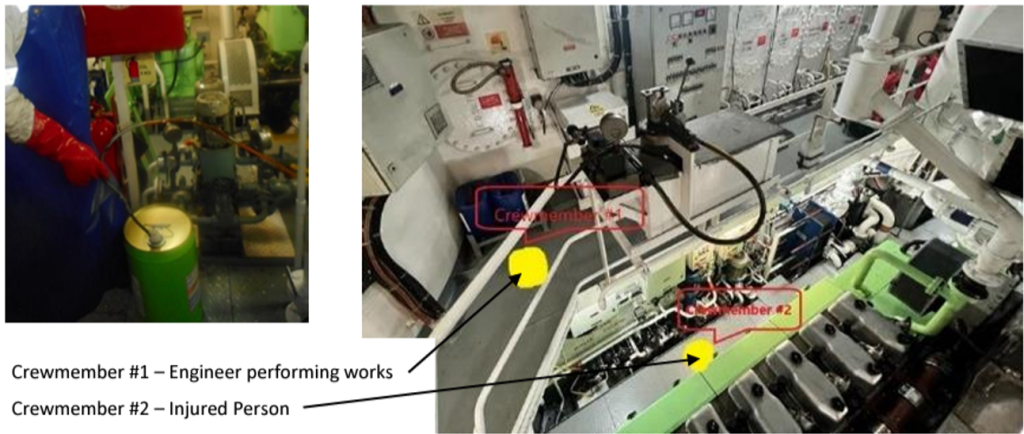- IP Code: Mandatory Code enters into force on 1 July. Make sure your company is up to speed with the changes.
- Early Bird tickets available for the IMCA Global Summit 2024. 3-4 December, Utrecht, Netherlands. Members can save £400.
- Discover how we are helping Members reduce emissions: Explore the ProjectGHG hub now.
- Now booking. Join the Lifting and Rigging community at our Technical Seminar in Amsterdam. Thursday 12 September 2024
- Now booking. Underwater Ship Husbandry Seminar. 10 October 2024, Singapore.
MSF: Chemical Handling – Eye Burn
What happened
The Marine Safety Forum published Safety Alert 23-20 relating to someone getting an eye injury as a result of getting chemicals in their eye. The incident occurred when an engineer was preparing equipment for treating fuel tanks with biocide. Correct PPE was used for the job and a toolbox talk was carried out. A portable pneumatic pump was in use for this job. During checks of the pump, a small splash/spray was released from the hose.
At that exact moment someone was passing by on the deck below. A few drops of biocide splashed on to that persons’ head. Although safety glasses were worn, some of the chemical caused irritation in the persons’ eye. He immediately went to the workshop to wash his eyes with water, alerted the engineer who provided eyewash liquid and informed the bridge about the incident. The Chief Officer provided first aid and transport to the hospital was arranged. The incident resulted in a small burn to the eye and the injured person was provided with antibiotic cream for several days.

What went wrong
The following was noted:
- A toolbox talk had been held but no safeguards where put in place to prevent encroachment around or below the area of the chemical transfer operation;
- The areas around and below the chemical transfer operation had not been taped off, (hazard tape) or signage posted to prevent personnel not involved in the operation from entering the area.
What was the cause
There was inadequate assessment of the risks involved: even drops of fluid are dropped objects. The area underneath ought to have been barriered off.
Corrective actions
- Relocate this chemical transfer operation to a more suitable location;
- Review risk assessment;
- Reiterate chemical handling issues in toolbox talks / safety meeting.
Members may wish to refer to:
Safety Event
Published: 19 March 2024
Download: IMCA SF 06/24
IMCA Safety Flashes
Submit a Report
IMCA Safety Flashes summarise key safety matters and incidents, allowing lessons to be more easily learnt for the benefit of all. The effectiveness of the IMCA Safety Flash system depends on Members sharing information and so avoiding repeat incidents. Please consider adding [email protected] to your internal distribution list for safety alerts or manually submitting information on incidents you consider may be relevant. All information is anonymised or sanitised, as appropriate.
IMCA’s store terms and conditions (https://www.imca-int.com/legal-notices/terms/) apply to all downloads from IMCA’s website, including this document.
IMCA makes every effort to ensure the accuracy and reliability of the data contained in the documents it publishes, but IMCA shall not be liable for any guidance and/or recommendation and/or statement herein contained. The information contained in this document does not fulfil or replace any individual’s or Member's legal, regulatory or other duties or obligations in respect of their operations. Individuals and Members remain solely responsible for the safe, lawful and proper conduct of their operations.
